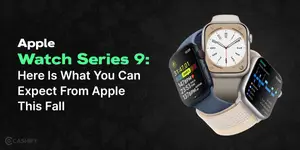Ever found yourself staring helplessly at your MacBook, wondering why the touchpad refuses to respond? It’s in these moments you realize just how essential that little rectangular box beneath your keyboard truly is. It’s like the heartbeat of our daily computing tasks, and without it, our MacBook might as well be a paperweight.
But worry not! Even when your touchpad decides to take an unscheduled break, there’s no need to panic. We’ve got your back! In this article, we’ll guide you through some tried-and-true troubleshooting steps that can bring your touchpad back to life. So, sit tight and read on to discover how to fix Macbook trackpad not working issue and restore your MacBook’s trackpad to its good old days.
Also Read: Is The 2020 M1 MacBook Air Still A Worthy Buy In 2023?
8 Ways To Fix MacBook Trackpad Not Working
1. Check Your Trackpad Settings
If you are facing issues with trackpad on your Macbook then the first thing you need to check and enable Force Click and Haptic feedback from settings:
1. Click on the Apple Logo at the top left, select ‘System Settings’ and then ‘Trackpad’
2. Now enable the Force Click and haptic feedback toggle to enable it
The second setting to look out for is ‘Tracking Speed’. Under the same trackpad setting try increasing and decreasing the “Tracking Speed” under “Point and Click”. And check if this resolves the issue.
2. Check Accessibility Settings
If you have a wireless mouse or wireless trackpad connected to your Macbook then in that case you might feel inconsistent pointer movement from the trackpad. To fix the issue you need to disconnect these devices and check if this resolved the issue.
There could be a case where the trackpad was disabled from settings. This usually happens if you have a wireless mouse or trackpad connected to your Macbook. To toggle the trackpad you need to follow the given steps:
1. Head over to System Settings > Accessibility > Pointer
2. Now look for ‘Ignore built-in trackpad when mouse or wireless trackpad is preset’ settings toggle and make sure then is disabled.
3. Also check for ‘Use Trackpad for scrolling’ toggle under “Trackpad Options” and enable it.
Also Read: Why Should You Choose Apple MacBook Air Over Any Laptop?
2. Reset the PRAM / NVRAM
Your MacBook’s PRAM (Parameter Random Access Memory) and NVRAM (Non-Volatile Random Access Memory) store certain settings related to sound volume, display resolution, startup disk selection, and more. Sometimes, resetting these can fix trackpad issues. To do so, here are the steps you can follow:
NVRAM and PRAM reset for Intel-based Macs:
Step 1: Firstly, power off your Mac entirely.
Step 2: Next, restart your machine while simultaneously pressing the following keys: Option + Command + P + R
Step 3: After 20 seconds, upon hearing the startup chime or seeing the Apple logo, let go of the keys and patiently wait for your Mac to reboot.
It is not possible to reset the NVRAM and PRAM on a Mac with Apple silicon because your machine automatically handles this when an issue is detected and powered up from a shutdown.
This is because the NVRAM and PRAM store important information about your Mac’s hardware and settings. You can reset them and sometimes it fixes problems that are caused by corrupted or outdated information. However, since your Mac automatically handles this process, there is no need for you to do it manually.
3. Perform an SMC Reset
The System Management Controller (SMC) controls a variety of hardware functions on your MacBook, including the trackpad. Resetting it can often resolve issues.
For MacBooks with removable batteries, here’s how you can perform SMC reset:
Step 1: Completely power off your MacBook.
Step 2: Disconnect the power adapter from your MacBook.
Step 3: Carefully remove the battery from your MacBook (If you have older Macbook variants with removable battery)
Step 4: Once the battery is removed, press and hold the power button for approximately ten seconds.
Step 5: After ten seconds, release the power button.
Step 6: Reinstall the battery back into its compartment.
Step 7: Reconnect the power adapter to your MacBook.
Step 8: Finally, power on your MacBook by pressing the power button.
For models with non-removable batteries, shut down, connect to a power source, hold Shift + Control + Option and the power button for 10 seconds, then release and boot up.
Also Read: MacBook Air M2 vs MacBook Air M1: Quick Comparison
4. Update Your macOS
Keeping your operating system up-to-date is crucial for smooth performance and can also resolve trackpad issues. If updating your OS doesn’t do the trick, consider reinstalling it via Mac Recovery Mode. Remember, it’s crucial to back up your data before updating or reinstalling macOS on your MacBook Pro. You can move your files to an external hard drive or utilize a cloud storage service such as iCloud or Dropbox. Follow these steps to update or reinstall macOS and hopefully resolve the unresponsive trackpad issue:
Step 1: Go to the Apple menu and choose “System Preferences”.
Step 2: Select “Software Update” and check for any available updates. If there are any, click on “Update Now” to install them on your Mac.
Step 3: Another alternative is to reinstall the macOS. For this, hold down the “Command” + “R” keys until the Apple logo appears. This will boot your MacBook into macOS Recovery.
Step 4: Choose “Reinstall macOS Ventura” and follow the simple on-screen instructions.
5. Delete Certain Property List Files
If you’re concerned that none of the other methods have worked, this one will! Property List (plist) files store preferences and configuration information for various applications and processes on a Mac. macOS uses them to store a variety of settings and preferences, such as keyboard shortcuts, display resolution, network configurations, and more. Deleting a plist file associated with a trackpad can often help to resolve this issue. Follow these simple steps:
Sure, here are the steps to delete the specified files:
Step 1: Open Finder on your MacBook.
Step 2: Press ‘Command+Shift+G’ on your keyboard.
Step 3: A dialog box will appear. Type in ‘~/Library/Preferences/’ and hit Enter.
Step 4: In the Preferences folder, look for any files these files:
com.apple.preference.trackpad.plist
com.apple.AppleMultitouchTrackpad.plist
Step 5: Move these files to the desktop. This will act as a backup in case you need to restore them later.
After moving the files, you have to restart your MacBook. Now you can check and see if the trackpad issue has been resolved.
6. Boot in Safe Mode
Safe mode starts your MacBook with minimum necessary processes and disables third-party software that might be causing trouble. To boot in safe mode, Restart your MacBook and hold down the Shift Key until the Apple logo appears. If the trackpad works in safe mode, the problem likely lies with some software on your device.
7. Investigate Potential Hardware Issues
If none of the software fixes work, it’s time to consider hardware issues. Is there any debris lodged under the trackpad? Has liquid been spilled on the device recently? Another common culprit is a swollen battery, which can exert pressure on the trackpad from underneath. If you suspect a hardware issue, it’s best to consult a professional rather than attempting DIY repairs.
Also Read: Which Apple Macbook Pro Should You Buy?
8. Run Apple Diagnostics
Your MacBook can run a simple diagnostics check from startup to help identify any hardware issues that may be causing problems and identify the cause of Macbook trackpad not working issue. Here’s how to do it:
Step 1: Disconnect all external devices except the keyboard, mouse, display, Ethernet connection (if applicable), and connection to AC power.
Step 2: Make sure that your MacBook is on a hard, flat, stable surface with good ventilation.
Step 3: Shut down your MacBook.
Step 4: Turn on your MacBook and then immediately press and hold the “D” key on your keyboard. Keep holding it down until you see a screen asking you to choose your language.
Step 5: When the “Choose your language” screen appears, select your language. Apple Diagnostics will begin automatically after this selection.
Step 6: After the tests are complete, you’ll be presented with a summary of test results. You can get details about any issues found by selecting them from the list.
Step 7: To quit Apple Diagnostics, click “Restart” or “Shut Down.”
Also Read: Best USB-C Hubs For MacBook
















